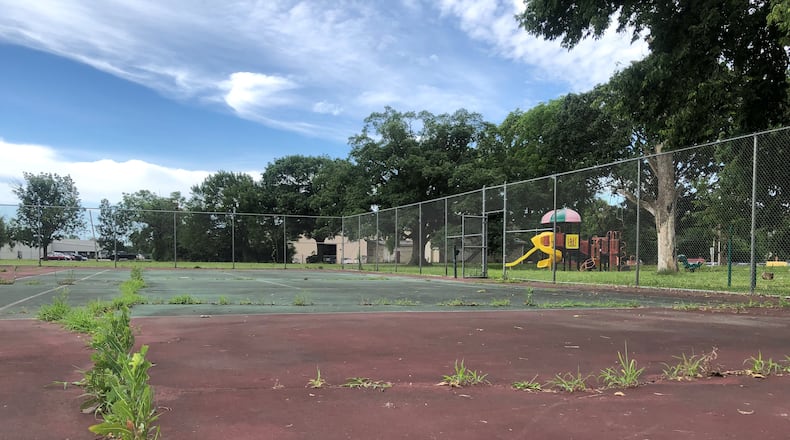Lifelong skateboarder David Schweitzer proposes building a do-it-yourself (DIY) skatepark on the courts at Claridge Park, located at the southwest corner of Webster and Lamar streets.
The project would fulfill Schweitzer’s 20-year-long dream to bring a skatepark to the Gem City. DIY skateparks are self-built by third-parties, instead of by municipalities or other other public agencies.
“This is a way to revitalize the area and bring something new ― some new energy ― to this area,” Schweitzer said.
Claridge Park is a five-acre, city-owned park and its tennis courts may date as far back as the 1940s, city staff said. But the tennis courts no longer have nets and the court surface is cracked, with weeds jutting out.
This week, Dayton’s Board of Zoning Appeals approved a conditional use request to construct a DIY skatepark on the courts.
Some people raised concerns about noise, parking and the hours of operation of the proposed skatepark during a Northeast Priority Land Use Board meeting.
Credit: STAFF
Credit: STAFF
But city staff said residents generally supported the proposal and the board unanimously voted to recommend approval of the conditional use request.
The courts at the park site are underutilized but can be resurfaced, and the skatepark seems to be a good fit for the neighborhood, said Jennifer Hanauer, a city of Dayton planner.
“Skateparks produce less noise than a little league game,” she said. “Skateboards are much quieter than you might think.”
The skatepark is expected to be open from dawn to dusk, like other city parks, and no additional lighting is planned, she said.
Hanauer said the city had to figure out how it could allow a third-party to build a skatepark that could be potentially dangerous.
The city developed a memorandum of understanding with a local nonprofit, the Dayton Collaboratory, which partnered with Schweitzer on the project.
The agreement contains an indemnification clause and the document also says the collaboratory will be responsible for maintaining the skatepark and having insurance during its construction.
“By having this MOU, we are establishing kind of a roadmap for what happens if something needs to be repaired,” Hanauer said.
Schweitzer said he has wanted to bring a skatepark to Dayton since he moved back to the city in 2000 and he has been working on this project for about two years.
DIY skateparks became popular in the 1990s, after the DIY Burnside skatepark in Portland, Oregon, gained national acclaim and recognition.
This skatepark will be centrally located and is for the whole community, Schweitzer said.
“This is a way to get kids out into the open air — into the fresh air — away from the TV and get some exercise,” he said.
Skateboarding creates friendships and connections between people from all walks of life, he said.
Skateboarding makes its Olympic debut in Tokyo next month, which should fuel interest in the activity, Schweitzer said, and roller skating also is making a comeback.
About the Author


